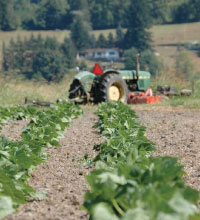Soil & Sea: reports from our producers
This article was originally published in February 2013

The amount of land needed to grow crops worldwide is at a peak and an area more than twice the size of France can return to nature by 2060 due to rising yields and slower population growth, according to a new report in the journal “Population and Development Review.”
If correct, the land freed up from crop farming would be some 10 percent of what currently is in use. The report conflicts with U.N. studies that say more cropland will be needed in coming decades to avert hunger and price spikes.
Thieves in Canada made off with $18 million (6 million pounds) of maple syrup, which they stole over time from what is essentially a syrup cartel. It’s suspected to be an “inside job.” This wasn’t the first significant maple syrup theft in the province: in 2006, thieves took about $1.3 million worth.
The exploding popularity of white and black organic chia seeds means demand is outstripping supply and shortages in the coming year are possible. Chia is showing up in beverages, enhanced waters, protein bars, salad and grain mixes, and as an ingredient in recipes. Chia seeds are a nutty-tasting whole grain, rich in omega-3 fats, fiber, calcium and magnesium.
Popcorn and tofu lovers may be in for sticker shock this year: prices for corn and soybeans have increased sharply due to drought in the Midwest. Even corn and soybeans grown for human consumption are being sold as cattle feed at very high costs.
U.S. catfish production has been dropping for more than 10 years and in 2010 alone some 20 percent of the farmers either gave up or switched to farming corn or soybeans.
The shortage of fish in 2011 caused desperate processors to bid exorbitant prices in order to get fish. They figured they could pass the costs on to loyal buyers of American catfish, but buyers switched to Vietnamese catfish and Chinese tilapia, which were less than half the price of American catfish.
